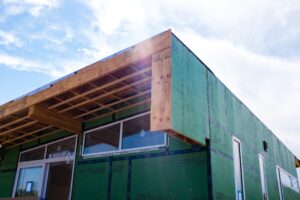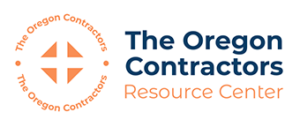As the nation’s number one builders risk program, we receive questions from contractors across the country on the topic of builders risk insurance for new home construction. In this resource, we answer some of the most common questions to ensure your vision is properly protected throughout the course of construction.

Nuts and Bolts
Q: Should a builders risk policy be purchased in the name of the contractor or the homeowner?
A: One great feature of builders risk insurance is that a policy can be written in the name of either the contractor or the homeowner. Policy features, benefits, and terms remain the same, no matter who is identified as the insured. Remember that the named insured has some contractual rights and benefits under the insurance contract. You will retain those rights as the policyholder, regardless of whether you are the contractor, homeowner, or other entity.
Q: How is the project value determined?
A: Zurich defines total completed value as the total of all costs associated with the building and designing of the covered property, including labor, overhead, and materials. The total completed value excludes land cost. In addition to the building and design costs, you may choose to insure a percentage of the building profit. Share a copy of the construction agreement or cost breakdown to review a list of required coverages and verify the total completed value.
Q: What policies are available for residential new construction?
A: Agents and brokers can secure builders risk coverage for nearly any residential new construction project under a single structure policy (also known as a one-shot) or a reporting form policy. Single structure builders risk policies are designed to cover one specific structure or project under construction. This policy is ideal for homeowners or contractors insuring one project within a given time. These policies typically have a 12-month policy term, with the option to renew. A residential reporting form is designed to help contractors and their insurance agents manage coverage for multiple new construction projects under the same policy. This policy must be issued under the contractor’s name and requires periodic reporting of new project starts or inventory depending on the annual or monthly rate selected by the contractor. If you are comfortable managing the ongoing reporting requirements and associated premium payments, this might be a convenient policy for you.
Q: What is the difference between new construction and remodeling?
A: Often, we find certain scenarios make it challenging for clients and agents to identify whether the project is new construction or remodeling. When securing a builders risk policy where coverage and exposures may vary depending on the project type, it is important to understand the differences. Residential new construction is built from the ground up, where there was no previous existing structure before the project work began, and it has yet to be put to its intended use. If there is an existing structure that will be modified in some manner (including adding a new addition to an existing structure), the project is considered remodeling rather than new construction. Additionally, if the structure was demolished but the foundation remains, the project can be considered remodeling in some cases.
Coverage and Policy Options
Q: What considerations are key when comparing homeowner’s and builders risk policies?
A: One of the biggest considerations when comparing policies for residential new construction is cost. It is typically more cost-effective to choose a builders risk policy than a homeowners insurance policy for residential new construction because the policyholder is not paying to cover contents — just the structure to be built. Builders risk policies also include coverages that are not typically available in homeowners insurance policies, including debris removal, pollution clean-up, property in transit, and even property stored offsite in a temporary location. Another consideration is the length of time coverage is available. While some homeowners insurance policies do include endorsements that cover structures under construction, coverage may be limited to twelve months, after which time the policy would expire. If the project is delayed or remains unoccupied, coverage would not continue past the policy term. Whereas in builders risk insurance, there is an opportunity to renew.
Q: Is there an option to increase the coverage limits, should the insured change materials or fixtures during the course of construction?
A: Homeowners often change their minds about building materials after the start of construction, and change orders are routine in residential construction. If policy limits are not properly adjusted to reflect the change in increased value, a loss could leave your client underinsured and with possible penalties. Some providers offer additional protection to cover such change orders, helping the client avoid possible coinsurance penalties if a claim should occur before the increase in completed value is properly reported to the provider. The added protection is done as a change order endorsement for additional coverage of up to 10, 20, or 30 percent increments should the total value increase during the policy term. The endorsement provides the insured with peace of mind knowing that coverage is in place if it is needed to protect them from additional loss.

Q: What benefits does the insured gain when purchasing a reporting form or blanket policy?
A: The reporting form is continuous, meaning there is no expiration date for the policy. Instead of issuing a separate, new insurance policy for the start of every new construction project, the single reporting form or blanket policy covers all of the new homes being built. The benefit for you is that once you have a reporting form or blanket policy in place, you know upfront what your rates and coverages are under the insurance contract, subject to underwriting guidelines. Another benefit for contractors is that you might be able to take advantage of a large builder credit if you build more than 50 homes in a 12-month period.
Misconceptions
Q: Why would my residential clients need soft-cost coverage?
A: When a covered loss occurs, there could be unexpected expenses for homeowners such as additional building permits, interest on construction loans, insurance premiums, architects’ fees, and more. Soft cost coverage provides insurance protection for costs that arise solely because of a covered loss. It is important to note that coverage is not automatic just because soft cost is included in the policy; those expenses are only covered when a covered cause of loss is the reason the soft costs’ expense was re-incurred. Often, the policy contains a deductible, calculated by the number of days the project is delayed before soft coverage applies.
Q: Is a builders risk policy renewable?
A: In most cases, residential builders risk policies can be extended or renewed for an additional 12-month period. Builders risk insurance covers residential new construction after completion while it is up for sale, so the option to renew coverage for a second year can be valuable. If a third year of coverage is needed, you can then purchase an unsold dwelling policy.
Q: Can coverage be secured for a project already under construction?
A: In most cases, you can purchase builders risk insurance even if construction on your new home has already begun. Construction that is already more than 30 percent complete at the time of application is subject to underwriting approval before the policy can be issued.

